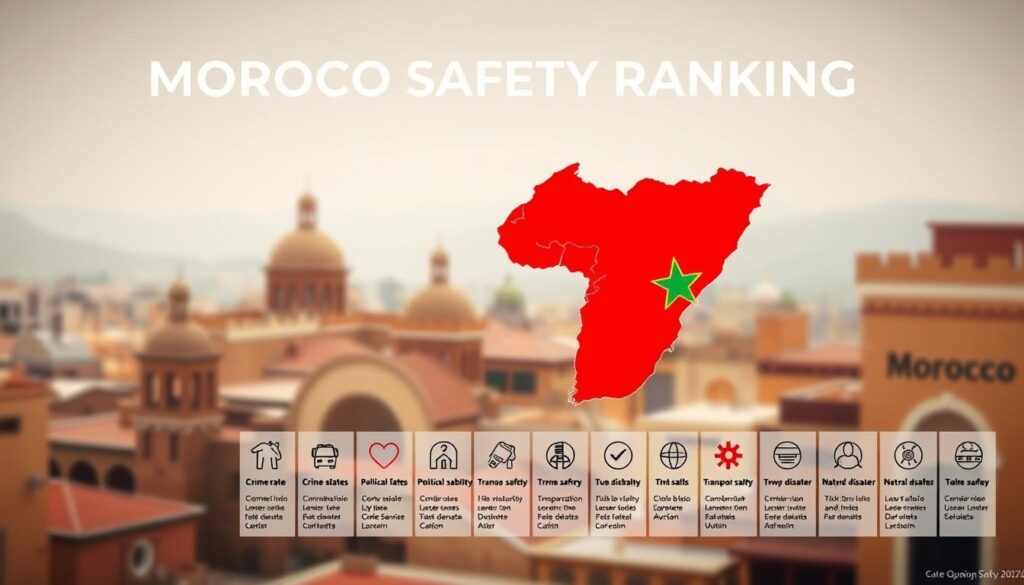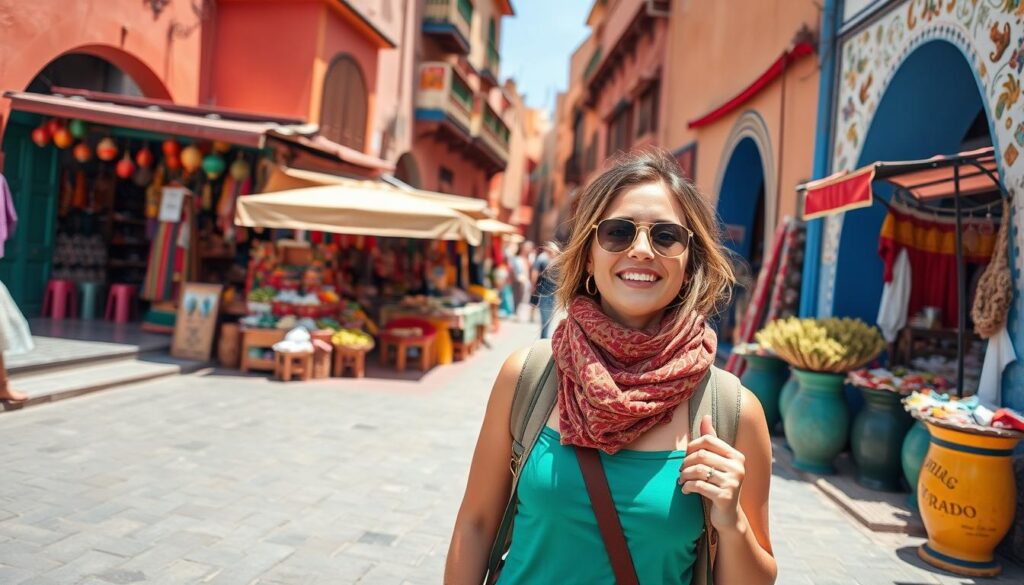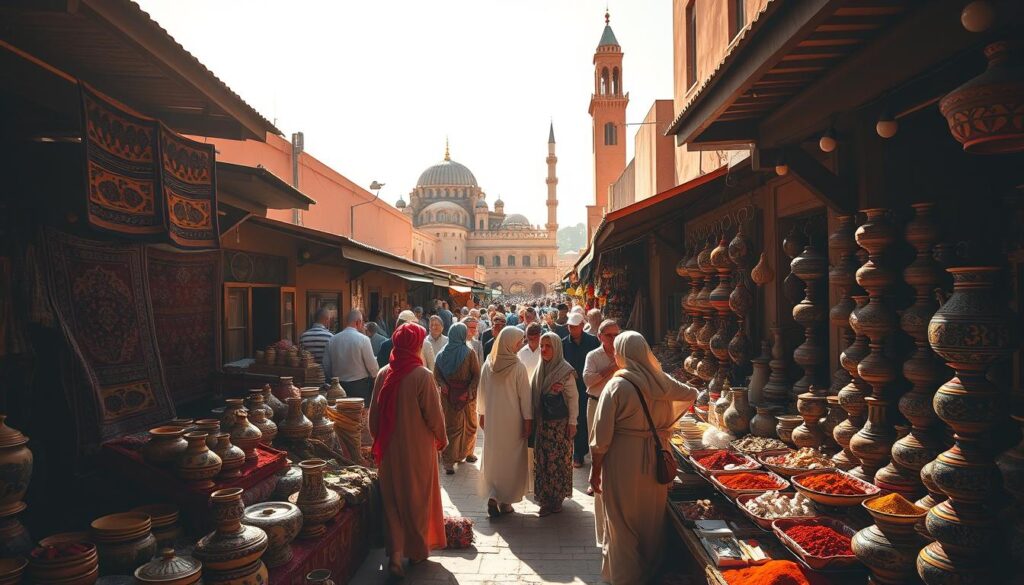As you plan your next travel destination, concerns about safety often arise, especially for a country like Morocco, which boasts a rich cultural heritage and breathtaking landscapes.
With its stable government and visible police presence, Morocco has consistently been considered a secure travel destination. The government maintains strong ties with global allies, enhancing the safety of international tourists.
For a stress-free trip, understanding specific safety concerns and taking proper precautions is essential. Morocco Disney Tours is here to guide you through your journey, offering personalized travel advice to ensure a memorable experience. Contact us at +16823085820 / +212773081754 or [email protected] for more information.
Key Takeaways
- Morocco is generally a safe country for international tourists.
- The government has a strong police presence and global alliances.
- Understanding specific safety concerns is crucial for a stress-free trip.
- Proper precautions and travel advice can enhance your travel experience.
- Morocco Disney Tours offers personalized guidance for a memorable journey.
Morocco Safety Overview
Morocco’s safety profile is multifaceted, reflecting different perspectives from international indices. The country’s safety is evaluated based on various criteria, including crime rates, political stability, and the effectiveness of its law enforcement.
Current Safety Situation in Morocco
Morocco has been investing heavily in security infrastructure, particularly in areas frequented by tourists. The government’s commitment to enhancing safety has contributed to a relatively stable environment for travellers. According to recent assessments, Morocco’s safety record is commendable, with low levels of political terror and controlled access to weapons.
The Moroccan government has prioritized tourism, resulting in significant improvements in security measures. This proactive approach has enhanced the overall safety for international travellers visiting the destination.
Understanding Morocco’s Safety Ranking
Morocco’s safety rankings vary across different international indices. In the Global Peace Index, Morocco is ranked 79th out of 163 countries, highlighting its relative stability. More impressively, it is ranked 24th in the Global Finance list of the world’s safest countries, ahead of several European nations.
| Index | Ranking | Total Countries |
|---|---|---|
| Global Peace Index | 79th | 163 |
| Global Finance Safest Countries | 24th | – |
| Berkshire Hathaway Travel Protection | 33rd | 42 |
These rankings indicate that while Morocco has areas for improvement, it remains a viable and relatively safe destination for travellers who exercise reasonable caution. The diverse rankings also reflect the complexity of evaluating a destination‘s safety.

Is Morocco Safe for Different Types of Travelers?
Morocco’s safety for different types of travelers is a multifaceted issue that requires a detailed look. The country attracts a wide range of visitors, from solo travelers to families, each with their unique concerns and needs.

Safety for Solo Travelers
Solo travelers, particularly women, often have specific safety concerns. While Morocco is generally considered safe for solo travelers, it’s essential to exercise caution, especially at night. Staying informed about local conditions and being mindful of one’s surroundings can significantly enhance safety.
Women’s Safety Considerations
For solo female travelers, Morocco can be a rewarding destination if properly prepared. Dressing modestly and being aware of local customs can help minimize unwanted attention. It’s also advisable to stay in well-lit, populated areas and avoid traveling alone at night.
Family Travel Safety
Morocco is generally a family-friendly destination, with many tourist areas like Marrakesh, Fez, and coastal resorts being well-equipped for family travelers. Families should make sure to take extra precautions against heat, particularly during the hot months (June-September), and be prepared for the curiosity and friendliness of local people toward foreign children.
Common Safety Concerns in Morocco
When traveling to Morocco, understanding the common safety concerns is crucial for a stress-free trip. While the country is generally considered safe for tourists, there are certain risks and areas to be aware of to ensure a safe and enjoyable journey.
Petty Crime and Scams
Petty crime, such as pickpocketing and scams, can be a problem in tourist areas and crowded cities like Marrakesh and Casablanca. Tourists should be cautious with their belongings, especially in crowded places and popular tourist sites. Being aware of your surroundings and keeping valuables secure can significantly reduce the risk of becoming a victim.
Terrorism Risk Assessment
The risk of terrorism is a concern in many countries, including Morocco. While the government has taken significant measures to enhance security, it’s essential for travelers to remain vigilant, especially in crowded places. Staying informed about local conditions and following government advisories can help mitigate this risk.
Political Stability
Morocco enjoys relatively strong political stability compared to some of its neighbors, with a constitutional monarchy that has maintained continuity and gradual reforms. However, certain areas, such as the Western Sahara territory and border regions, require caution due to complex political situations. Tourists should avoid these areas unless they are officially designated tourist zones.
| Safety Concern | Description | Precaution |
|---|---|---|
| Petty Crime | Pickpocketing and scams in tourist areas | Secure valuables and be aware of surroundings |
| Terrorism | Risk of terrorist attacks | Stay informed and follow government advisories |
| Political Unrest | Complex political situations in border regions | Avoid non-tourist areas and follow local guidance |

By understanding these safety concerns and taking necessary precautions, travelers can have a safe and enjoyable experience in Morocco. The government‘s efforts to maintain stability and security in tourist areas further enhance the safety of visitors.
Staying Safe in Major Moroccan Cities
Morocco’s major cities offer a blend of traditional culture and modern amenities, but understanding their safety nuances is crucial for a stress-free travel experience. Travelers should be aware of the specific safety considerations for each city to make the most of their visit.
Marrakesh Safety Tips
Marrakesh, known for its vibrant markets and rich history, requires travelers to be mindful of their surroundings, especially in crowded areas like the Medina. Petty theft and scams are common concerns, so it’s essential to keep valuables secure and be cautious of overly friendly strangers.
Casablanca Safety Guide
Casablanca, being a major economic hub, has a different pace compared to other Moroccan cities. While generally safe, it’s advisable to avoid displaying signs of wealth and to be aware of pickpocketing in busy areas.
Fez and Rabat Safety
Fez and Rabat, with their historical significance and cultural richness, are generally safe for tourists. However, as with any popular destination, being mindful of one’s belongings and avoiding walking alone in dimly lit areas at night is recommended.
Safety in Coastal Cities
Coastal cities like Essaouira, Agadir, and Tangier offer beautiful beaches and a relaxed atmosphere. However, when visiting these areas, it’s crucial to swim at designated beaches and be aware of strong currents. Additionally, female travelers should consider using private hotel beaches or those in dedicated tourist areas to avoid potential harassment.
When traveling to Morocco’s major cities, being informed about local conditions and taking necessary precautions can significantly enhance your safety and overall travel experience. Whether you’re exploring the vibrant streets of Marrakesh or enjoying the beaches in Essaouira, understanding the local safety landscape is key to a stress-free trip.
Transportation Safety in Morocco
Understanding transportation safety is crucial for a stress-free trip to Morocco. The country offers a variety of transportation options, including taxis, public transportation, rental cars, and trains, each with its own safety considerations.
Taxis and Ridesharing
When using taxis, it’s advisable to opt for registered, metered taxis or reputable ridesharing services to avoid scams. Always agree on the fare before you start your journey if the taxi doesn’t have a meter.
Public Transportation Tips
Morocco’s public transportation system is generally safe, with buses and trains connecting major cities. Be mindful of your belongings, especially in crowded areas, and keep an eye on your luggage during stops.
Road Safety for Drivers
If you plan to drive in Morocco, be aware that road conditions can vary significantly. Defensive driving is key, as local driving habits may differ from what you’re used to in your home country. Ensure you have the necessary documents and insurance for driving in Morocco.
Train and Bus Travel
Trains are a safe and comfortable way to travel between major cities. The Al-Boraq high-speed train is particularly praised for its service. For destinations not served by trains, CTM and Supratours buses offer reliable service with professional drivers. Both options allow you to enjoy Morocco’s diverse landscapes without the stress of navigating roads, making them ideal for relaxed intercity travel during your time in this beautiful part of the world.
Cultural Considerations for Safe Travel
To navigate Morocco safely, it’s essential to grasp the local cultural landscape. Morocco is a country deeply rooted in Islamic practices and beliefs, which are reflected in its customs, laws, and regulations.
Dress Code Recommendations
Visitors should prioritize conservative clothing to respect local norms. Dressing modestly not only shows respect for the culture but also helps in blending in and avoiding unwanted attention. Both men and women should ensure their attire covers their shoulders and knees.
Respecting Local Customs
Morocco is a conservative country where public displays of affection are generally frowned upon. Visitors should be mindful of this, especially when interacting with locals or in more traditional areas. Showing respect towards people and their beliefs is crucial for a harmonious travel experience.
Public Behavior Guidelines
Maintaining a respectful demeanor in public is vital. Loud or boisterous behavior can attract negative attention. Additionally, being cautious with displays of affection is advisable to avoid offending local sensitivities. Understanding and adhering to these guidelines can significantly enhance the safety and quality of your travel experience.

Health and Wellness Safety
To have a safe and enjoyable journey in Morocco, understanding the health and wellness safety aspects is essential. Ensuring you’re prepared for your trip can significantly impact your overall experience.
Food and Water Safety
Food and water safety are critical considerations when traveling to Morocco. It’s advisable to stick to bottled or filtered water and avoid consuming undercooked meat or raw vegetables. Regular handwashing is also a simple yet effective way to prevent illness.
- Avoid consuming tap water and ice.
- Choose restaurants that are popular and have good hygiene practices.
- Be cautious with street food, ensuring it’s cooked properly.
Healthcare Access
Morocco has a decent healthcare system, particularly in major cities like Marrakesh and Casablanca. However, it’s still important to have travel insurance that covers medical expenses. Knowing where to seek medical help is also crucial in case of an emergency.
Essential Medications and Vaccinations
Before traveling to Morocco, consult with a healthcare professional about recommended vaccinations, such as Hepatitis A and Typhoid. It’s also wise to pack a travel health kit with essentials like pain relievers, anti-diarrheal medication, and hand sanitizer.
Essential Safety Tips for Morocco Travel

To ensure a smooth and enjoyable journey to Morocco, consider these vital safety tips. Morocco is a country with a rich cultural heritage and diverse landscapes, making it a popular destination for travelers.
Pre-Trip Preparation
Before traveling to Morocco, it’s essential to prepare adequately. Download offline maps and translation apps to your smartphone to help navigate the country. Consider purchasing a local SIM card upon arrival for affordable data and calling capabilities.
Money and Document Safety
Be mindful of your belongings, especially in crowded areas and at ATMs. Keep your valuables secure and consider using a hotel safe. Make digital copies of your passport and other important documents, storing them securely online.
Communication and Emergency Contacts
Save essential emergency contacts in your phone and on paper, including local police, your country’s embassy, and your tour operator, such as Morocco Disney Tours (+16823085820 / +212773081754 or [email protected]). Establish check-in protocols with family or friends, particularly if traveling solo or venturing out at night. Using a credit card with travel insurance can also provide additional security.
Conclusion: Enjoying Morocco Safely with Professional Guidance
As travelers increasingly seek unique destinations, Morocco emerges as a top choice, offering a blend of history, culture, and natural beauty. With proper preparation and awareness, travelers can enjoy Morocco’s rich cultural heritage and stunning landscapes while maintaining their safety.
For a stress-free experience, consider utilizing professional guides and organized tours. Morocco Disney Tours offers specialized services that combine local expertise with international safety standards. By embracing the country’s unique character and taking reasonable safety precautions, travellers can have a memorable and enjoyable journey. For more information, contact us at: +16823085820 / +212773081754 or [email protected].